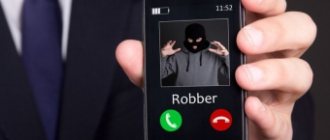Telephone threats can unsettle anyone when they are repeated day after day. But threats are different. If they call you and say that they have sent you a curse or a curse of thrones, this is most likely not serious. Law enforcement agencies rarely respond to such calls. But if they threaten to kill you and your children and at the same time call their names and school address, you should be wary.
People who threaten you over the phone with murder, torture, beatings can pay for this with forced labor for 20 days or restriction of freedom for various periods, they can be arrested and even imprisoned for 2 years.
They will be given such punishments if the victim really has reason to fear what they are threatening. Intimidation is considered real if there are facts indicating surveillance of the victim and his relatives.
Threats that are associated with political motives, ideological, racial hatred are fraught with punishment in the form of forced labor or imprisonment for up to 5 years. Such people will also be prohibited from working in certain positions and holding certain positions. Such provisions are contained in Article 119 of the Criminal Code of the Russian Federation (Criminal Code of the Russian Federation).
If there is no real threat to life and health, then there is no corpus delicti. But if the person being threatened knows the person on the other end of the line, he can take the case to court. In order not to be unfounded, he can record a threatening conversation on a telephone recorder.
It is advisable to structure the conversation in such a way that the threatening person gives himself away - gives the name and facts regarding the relationship with the interlocutor. Only if there is any evidence will the police begin to deal with such a case. You won't have to wait for anything else. And, in any case, immediately enlist the support of a lawyer.
Do you want to figure it out, but don’t have time to read the article? Lawyers will help
Entrust the task to professionals. Lawyers will complete the order at the cost you specify
27 lawyers on RTIGER.com can help with this issue
Solve the issue >
Threats by phone: how to collect evidence
You can, of course, record the conversation on a voice recorder, but it is still very difficult to collect evidence. After all, the person threatening can later say that his phone was stolen, but he himself did not call anyone, and did not intend to do anything. This is if you know someone. And if the call is anonymous, it will be even more difficult.
Try to collect evidence of the criminality of the person calling you. For this:
- record the conversation on your phone;
- determine the number - if possible, provide a qualifier;
- turn on speakerphone and ask others to be witnesses;
- take a video of the conversation so that the number is visible on the ID screen;
- Contact your mobile operator's office and ask for a call printout.
Don’t rush to block the scammer’s number, he can call from different phones. All of them need to be recorded and tried to “break through” on the Internet. To the police, describe in detail when and under what circumstances these calls began, and also tell us why you are afraid of them.
Wiretapping of telephone conversations will be allowed only after the police accept the complaint and initiate a criminal case.
As in bad movies, the police are more likely to accept a statement if the person threatening you has already tried to shoot you, and then called you, blackmailed you in some way, and committed other criminal acts. And it will be even better if you have already seen it and can describe it.
Memo for citizens on what to do if they receive a threat by phone
homeNews
Ministry of Emergency Situations
03.09.2013
Currently,
the telephone is the main channel for receiving messages containing information about planted explosive devices, taking people hostage, extortion and blackmail.
As a rule,
the factor of surprise, the resulting panic, and sometimes even shock, and the information received itself lead to the fact that a person is unable to correctly respond to a call, assess the reality of the threat and get the maximum information from the conversation.
Threatening calls may come to you personally and contain, for example, demands to pay a significant amount of money. If your phone
has received similar calls before or you have reason to believe that they may come, be sure to install an automatic caller ID (Caller ID) and a sound recording device on your phone.
If you have a Caller ID, immediately write down the determined phone number in your notebook to avoid accidentally losing it. If you have sound recording equipment, immediately remove the cassette (minidisc) with the recording of the conversation and take measures to ensure its safety. Be sure to install another cassette in its place. Remember
that without the caller's number and the audio recording of the conversation, law enforcement agencies have very little material to work with and no evidence base for use in court.
In the absence of
sound recording equipment and caller ID, the following actions will provide significant assistance to law enforcement agencies in preventing the commission of crimes and searching for criminals: * try to remember the conversation verbatim and record it on paper;
* during the conversation, note the gender and age of the caller, the features of his (her) speech: - voice (loud or quiet, low or high), - rate of speech (fast or slow), - pronunciation (clear, distorted, with a stutter, lisp, with an accent or dialect), - manner of speech (cheeky, mocking, with obscene expressions); * be sure to note the sound background (car noise, sound of television or radio equipment, voices, etc.); * mark the nature of the call - local or long-distance; * be sure to record the exact time the conversation started and its duration. It is necessary,
if possible, during the conversation to obtain answers to the following questions: * where, to whom, what phone number is this person calling?
* what specific demands does he (she) put forward? * does he (she) make the demands personally, act as an intermediary, or represent some group of people? * under what conditions does he (she) or they agree to abandon the plan? * how and when can I contact him (her)? *Who can or should you report this call? Try
to get the caller to give you the maximum possible amount of time for you to make a decision to “satisfy his demands” or take any other action.
Do not be afraid
of intimidation by criminals; after the end of the conversation, immediately report it to law enforcement agencies.
If you are afraid that your phone is being tapped by criminals, call from another number. Practice shows that concealing the fact of such threats significantly complicates the situation and contributes to the commission of crimes with impunity. Sector for Civil Defense and Emergency Situations of St. Petersburg State Public Institution "PSO Vyborg District" Territorial Department for the Vyborg District UGZ Main Directorate of the Ministry of Emergency Situations of Russia for St. Petersburg
Return to list
Telephone threats: what to do and what not to do
When talking to a criminal or blackmailer on the phone, try to suppress unnecessary emotions and calm down. If you were unable to make a recording right away, turn it on the next time you call. If you know him, call him by name so that the police understand that he is a real threat to your safety. If a stranger calls, ask his name and ask what exactly he needs.
Perhaps it will be possible to find out at least some details about the reasons for the calls. Ask him what he wants to do with you, what to do with your loved ones. Of course, this will not be the most pleasant conversation in your life, but this way, perhaps, you will be able to “talk” him.
The longer the conversation, the more you can learn about the threatening person and his location. Listen to extraneous sounds. So you can guess that this type is, for example, in a place of busy traffic or near a railway station. You can guess how old this person is approximately. Maybe he stutters or has a lisp. Any details will be helpful.
Here are some tips that law enforcement officers offer in such situations:
- do not provoke conflict, try to speak calmly;
- If you lose your temper and lose your temper, it’s better to hang up;
- do not give your name;
- do not ignore calls or delete messages from your phone;
- do not change the SIM card.
It’s not a fact that the police will believe you the first time and begin to figure it out, but it’s worth a try. Don't lose hope, record every little thing. On the second (third) call, tell the threatening person that you are recording the conversation on a voice recorder and will take the recording to the police. After that, he may leave you behind. Remember under what article he can be charged if he does not stop calling (Article 119 of the Criminal Code of the Russian Federation).
If necessary, call the helpline of the Main Directorate of the Ministry of Internal Affairs of your city. They will help you calm down. In addition, all calls in this service are recorded, which will be another proof of the reality of what is happening. Call the duty station of your police department, come and write a statement. If the police didn’t accept him, go to the prosecutor’s office, don’t give up.
In addition to the application, you will need all the documents obtained during conversations with people who make threats over the phone. These are audio and video recordings and even notes on paper if you recorded it by hand. Call printouts taken from the mobile operator. Photos, if possible.
A police report can be submitted on the State Services website. Collect a package of documents, send and wait for a response. If law enforcement officers decide that there are sufficient grounds to initiate a criminal case, an investigation will begin. On the portal you can also make a sample statement to the police, as well as make an appointment with the prosecutor’s office.
WHAT TO DO IN THE EVENT OF TELEPHONE TERRORISM
Currently, the telephone is the main channel for receiving messages containing information about planted explosive devices, taking people hostage, extortion and blackmail.
Usually, the factor of surprise, the resulting panic and sometimes shock state, and the acquired information itself lead to the fact that a person is unable to correctly respond to a call, assess the reality of the danger and get the maximum information from the conversation.
Dangerous calls may come to you personally and contain, for example, demands to pay a significant amount of money.
If your phone has previously received similar calls or you have reason to believe that they may come, you must install an automatic caller ID (Caller ID) and a sound recording device on your phone.
If you have a Caller ID, immediately write down the determined phone number in your notebook, which will help you avoid accidentally losing it.
If you have audio recording on your phone, use this function to record the conversation and take measures to keep it safe. if it is a landline telephone with mini-cassettes, remove the cassette with the recording of the conversation. Be sure to install another cassette in its place.
Remember that without the caller's number and the audio recording of the conversation, law enforcement agencies do not have enough material to work with and there is no evidence base for use in court.
In the absence of sound recording equipment and caller ID, your following actions will provide significant assistance to law enforcement agencies in preventing the commission of atrocities and searching for criminals:
• try to understand the conversation verbatim and record it on paper;
• during the conversation, note the gender and age of the caller, the features of his speech:
- voice (sonorous or quiet, small or high), - tempo of speech (fast or leisurely),
- pronunciation (clear, distorted, stuttering, lisping, with an accent or dialect),
- manner of speech (familiar, with mockery, with obscene expressions);
• be sure to note the sound background (the noise of cars or railway transport, the sound of television or radio equipment, voices, etc.);
• mark the nature of the call - local or long-distance;
• be sure to record a clear time when the conversation started and its duration. It is necessary, if possible, during the conversation to obtain answers to the following questions:
• where, to whom, what phone number is this person calling?
• what specific demands does he/she make?
• does he (she) make the demands personally, act as a mediator, or represent some group of people?
• on what criteria does he (she) or they agree to give up the mystery?
• how and when can I contact him/her?
• who can or should you tell about this call?
***
Try to get the caller a very reasonable period of time for you to make decisions to “satisfy his requirements” or take some other actions.
Do not be afraid of intimidation by criminals; after the end of the conversation, immediately report it to law enforcement agencies. If you are concerned that your phone is being tapped by criminals, call back from another number. Practice indicates that concealing the fact of similar threats significantly complicates the situation and contributes to the commission of crimes with impunity.
In addition to threats made over the phone to you personally, criminals can use your phone number to communicate information that you will have to pass on to law enforcement agencies. For example, your phone receives a call in which an unknown person reports that your house is mined. When conducting a conversation of this nature, try to follow the tips outlined above and get very likely information. Upon completion, immediately report this information to law enforcement authorities.
*** WHAT TO DO IF YOU HAVE RECEIVED NEWS ABOUT A TERROR ATTACK?
First, you need to remain calm. Then, in communication, try to find the motives for a possible terrorist attack, the location of the probable planting of explosive devices, their number, and the time of operation.
With all this, you should prolong the conversation on the phone, collect as much information as possible about the caller:
how he pronounces words - slowly, quickly, clearly, with a stutter, with an accent, with speech impediments; voice - timbre, volume, hoarse, drunk; manner of speaking - measured, confident, incomprehensible, incoherent, embittered, phlegmantic, courteous or indecent
extraneous noises accompanying the conversation: - street noise, telephone discussions, machines, the rumble of a tram, another voice, etc.
If you have an ID, you need to set the phone number of the caller. After the end of the conversation, or better yet, during it, without hanging up, report to the duty officer at the Ministry of Internal Affairs on another phone. If the speaker hangs up, place yours next to the phone - the communication channel will remain open for more than an hour.
If possible, record the conversation. The recording can be sent to the phono examination department, where special equipment will divide words into sounds, draw a graph of spoken words, which is inimitable for each person, and no attempts to distort or disguise one’s own voice will help the villain. The perpetrators may be subject to imprisonment for up to 5 years, and the parents of minor terrorists will have to compensate in court for all expenses associated with organizing and conducting measures to eliminate the consequences of the call.
***
WHAT TO DO IF, after the call, an EXPLOSIVE DEVICE is found
Without touching it, organize security, excluding access to third parties. Carry out a critical evacuation of people from the building to a non-hazardous distance, and, if necessary, carry out a critical shutdown of production. Turn off the supply of gas, electricity and heat to the building.
** How to protect the population, workers and employees of companies, children in child care institutions, students in schools, the sick and medical staff in healing institutions when there is a threat of explosion?
The only effective method of protection in our current conditions is the evacuation of people to a safe place.
An evacuation message can be received not only in the event of an explosive device being discovered and the consequences of a terrorist act being eliminated, but also in the event of a fire, natural disaster, etc.
When you receive a message from government officials or law enforcement agencies about the start of an evacuation, remain calm and obey their commands.
***
IF YOU ARE IN THE APARTMENT, do the following:
• take personal documents, funds and valuables;
• turn off electricity, water and gas;
• assist in the evacuation of old and seriously ill people;
• be sure to lock the front door - this will protect the apartment from possible entry by looters.
Avoid panic, hysterics and haste. Leave the premises in an orderly manner.
Return to the abandoned premises only after permission from the responsible persons.
Remember that the life and health of many people will depend on the consistency and clarity of your actions.
***
Children and kindergarten staff can be evacuated to an adjacent kindergarten or by bus to a more distant one, which must be told to parents.
*** School directors are required by their position to work through actions with schoolchildren in the event of a critical evacuation at least once every six months. It is necessary to predict the gathering place where students should be during the inspection of the school, for example, in the assembly hall of the administrative building located across the road, etc. Riot police posts exclude outsiders from entering the school. To prevent panic, the evacuation should be carried out under the guise of civilian defense training, reducing to a minimum the number of people who know about the real reason for the measures being taken.
***
Information for heads of companies, organizations and institutions.
Currently, the telephone is the main channel for receiving messages containing information about planted explosive devices, taking people hostage, extortion and blackmail.
The following preventive actions will provide significant assistance to law enforcement agencies when conducting operational-search activities based on these facts:
• instructing personnel on the procedure to follow when receiving telephone messages containing terrorist threats;
• equipping the facility's telephones, designated in official directories, with automatic caller ID (Caller ID) and sound recording equipment.
Do not ignore any such signal. Ensure timely transfer of acquired information to law enforcement agencies.
***
Information for managers of healing institutions.
In March, maternity hospital No. 2 in Moscow received a telephone call about a bomb planted in the basement. A decision was made to immediately evacuate everyone from the maternity hospital. Some of the patients—about 20 people—were considered likely to be allowed to go home: they called their relatives and they came for them. About 80 postpartum women, together with their children, wrapped in blankets (it was still cold outside), were transported to adjacent maternity hospitals in ambulances. The evacuation lasted 45 minutes.
A month later, a similar threatening call came in the morning at the 15th city clinic. To evacuate almost one and a half thousand patients to other healing institutions, 3 buses removed from one of the routes, 4 intensive care vehicles and about 50 ambulances were used. Among the patients, about 300 people were in a languid state after the operation, some were in shock. They were taken out on special gurneys from the intensive care unit. The evacuation of all the sick took less than an hour.
Fortunately, during inspection there was no explosive device in both cases.
*** Food for thought. Once a year, about 50 telephone calls with the danger of an explosion are registered in the Smolensk region, of which about 40 are in Smolensk. The attackers reported a bomb planted near the building of the Smolensk Experimental Drama Theater, in a supermarket, in the medical academy, etc.
When more than 40 similar telephone threats were made in Izhevsk in just one month, as a result of promptly taken measures, it was possible to detain 17 suspects: 14 of the callers were schoolchildren. How was this done? Shouldn't the Smolensk services of the Ministry of Internal Affairs adopt the experience?
In Izhevsk, it was decided to reduce the number of working street pay phones for a short period of time: in most cases, they are dangerous. The remaining telephones that were not disconnected were taken under control, and patrol cars were constantly on duty near payphones, especially in the area of schools and other educational institutions; We installed professionals on duty at the automatic telephone exchange, who “detected” the messages of the attackers and transmitted them through direct communication channels to those on duty at the Ministry of Internal Affairs. Criminal cases were opened against the detainees and transferred to the tribunal.
Often the dangers turn out to be wrong. But explosions also happen in reality.
Be on your guard: the anonymous villain may not be joking, and then... To be honest, I don’t want to think about it. Is it necessary
PS:
By the way, Telephone terrorists will face a five-year sentence
At the end of January 2014, the Government submitted a bill to the State Duma for consideration, which proposes to increase prison sentences from 3 to 5 years for incorrect reporting of a terrorist attack if it caused great harm or other serious consequences. ITAR-TASS was told about this by the staff of the lower house of parliament.
Namely, the Cabinet of Ministers proposes to supplement Article 207 of the Criminal Code of the Russian Federation with a new clause, according to which incorrect information in advance about an impending explosion, arson or other actions that create a danger of death of people, if it caused great harm or other serious consequences, will be punishable by a fine of 200 thousand up to 500 thousand rubles, either in the amount of the salary or other income of the convicted person for a period of 1.5 to 3 years, or by imprisonment for a term of up to 5 years. Losses exceeding 1 million rubles will be considered great harm.
#survival_in_the_city_personal_security #survival_terrorism
Elen Adikaeva
In such cases, the facility manager is obliged to:
- do not ignore any such call; — stop access of people to the premises of the facility and (with the assistance of employees of the Ministry of Internal Affairs and special services) organize the evacuation of people in the building (according to the evacuation plan); — organize the evacuation of basic documentation in pre-prepared bags. Ensure their protection by specially appointed persons in a designated place at a safe distance from the facility; — after carrying out evacuation measures, organize a cordon of the facility by the security service; - upon arrival of the operational services of the Ministry of Internal Affairs, FSB, Ministry of Emergency Situations, organize the unhindered work of the operational investigative group, dog handlers, providing comprehensive assistance and assistance in the performance of their official duty.
Law enforcement agencies and the Operational Headquarters (for managing counter-terrorism operations in the district) will greatly benefit from your following actions to prevent the commission of crimes and search for criminals:
If you have an automatic number identifier (ANI), immediately write down the identified phone number in a notebook, which will avoid its accidental loss.
Try:
1. immediately turn on the audio recording of the conversation (if the telephone has an automatic recording device, a voice recorder);
2. remember the conversation verbatim and record it on paper.
As the conversation progresses, try to identify and remember:
1. gender, approximate age of the caller;
2. features of his (her) speech: loud (quiet) voice, low (high);
3. rate of speech: fast (slow);
4. pronunciation: distinct, distorted, with a stutter, with a lisp with a stutter, with an accent or dialect;
5. manner of speech: loose, mocking, with obscene expressions.
Be sure to note:
sound background (noise of cars or railway or other modes of transport, sounds of television and radio equipment, voices, as well as others);
nature of the call (local or long-distance – long).
Be sure to record the exact time the conversation started and its duration. In any case, try to get answers to the following questions during the conversation:
1. where, to whom, what phone number is this person calling?
2. What specific demands does he (she) put forward?
3. Does he (she) put forward the demands personally or act as an intermediary, or represent any group of persons, organization?
4. On what conditions does he (she) or they agree to abandon the plan?
5. how and when can I contact him (her)?
6. Who can or should you inform about this call?
Try to get the caller to give the caller as much time as possible for you and your management to make decisions or take any action.
If possible, during the conversation, inform the management of the facility about it; if not, immediately after it ends and immediately notify the police (if you are afraid that your phone is being tapped by criminals, call back from another number).
Do not talk about the fact of the conversation and its content. Limit as much as possible the number of people allowed to view the information received.
When using sound recording equipment, immediately remove the cassette (mini-disc) containing the recording of the conversation and take measures to ensure its safety. Be sure to replace the seized audio cassette (mini-disc) with another storage medium.








